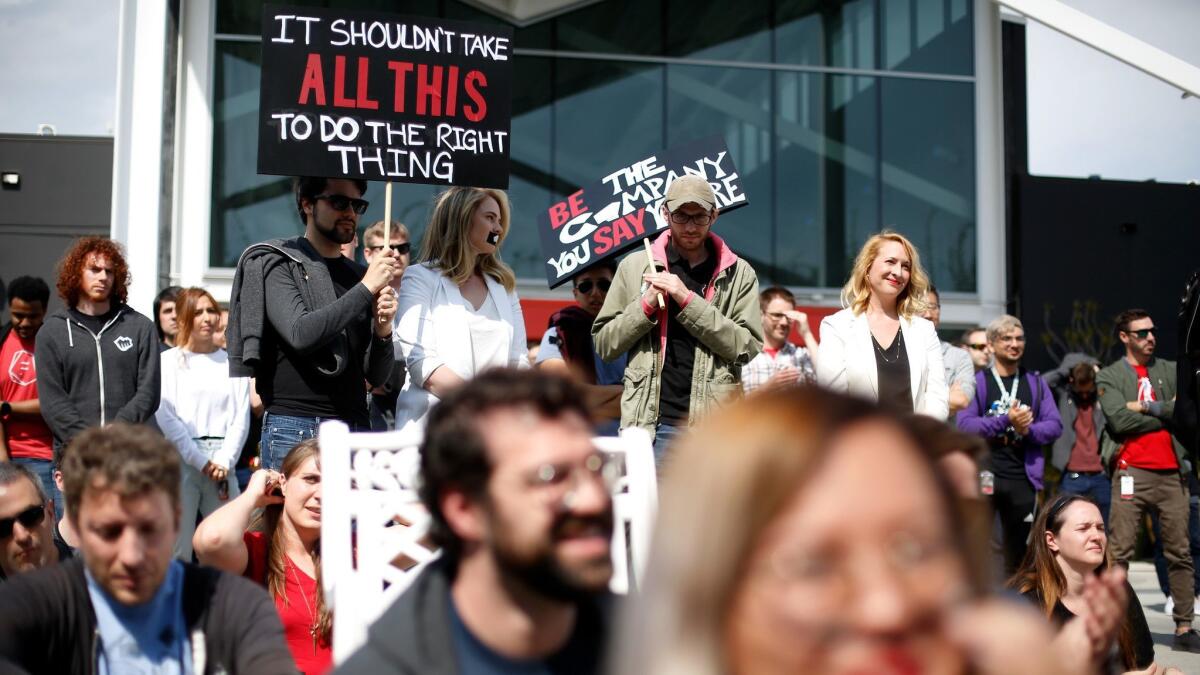Riot Games keeps requiring arbitration in sexual harassment cases, despite protest

Riot Games will still require employees to go through arbitration with the company — rather than a trial — over complaints of sexual harassment or discrimination, the “League of Legends” video game maker said Thursday.
Riot’s decision comes a week after more than 200 workers walked out of its Los Angeles headquarters to protest what employees have described as a culture of sexism at the company and its handling of two sexual discrimination lawsuits.
Citing the “complexities” of ongoing lawsuits, Riot said it will not change its employee agreements while in active litigation. Five current and former employees have sued the company in recent months, alleging gender-based discrimination, retaliation and harassment, as well as violations of California’s Equal Pay Act.
Riot has disputed their claims, saying it has a “zero-tolerance policy on discrimination, harassment, retaliation, bullying and general toxicity.” When asked to explain the policy and how the company defines “general toxicity,” company spokesman Joe Hixson said in an email that the company is rewriting its code of conduct to include “more explicit infractions and consequences than we’ve defined in the past.”
The company did not rule out allowing alternatives to arbitration in the future.
“We remain committed to having a firm answer around extending an opt-out to all Rioters when active litigation concludes,” Riot said in a Thursday night blog post. “Everything we’ve heard will impact our discussions when we revisit arbitration and we hope to have an answer that will be satisfying to everyone.”
Riot will give new employees the option to opt out of arbitration on individual sexual harassment claims, but only after current litigation is concluded, Hixson said.
Last month, the company pushed plaintiffs in two sexual discrimination lawsuits into arbitration, rather than allowing the cases to go to trial. Studies have shown that employees win less often in arbitration than they do in court.
“We’re disappointed leadership doesn’t seem to be considering any major changes to their active policy,” employees Indu Reddy, Ronnie Blackburn and Jocelyn Monahan — three leaders behind last week’s walkout — said in a statement Friday.
The leaders said they are “weighing the options” for their next steps and will share more information next week. “As we continue to pressure Riot to end forced arbitration, we are leveraging that teamwork and solidarity by involving more coworkers in the effort,” they said.
Riot said it is starting an employee forum for participating in “formal discussions” on diversity and inclusion. The company said it has also invited a “diverse” group of workers to review parts of the company’s code of conduct.
The company, a division of Chinese internet behemoth Tencent Holdings Ltd., was founded in 2006 by two friends from business school. It has become a giant in the world of gaming and esports.
The culture of gaming has been beset by conflict in recent years, starting with a controversy known as Gamergate, which served as something of a preview to the contentious online conflicts of the Trump era.
Riot has been criticized since articles late last year described an environment of casual sexism and harassment. Over the last year, Riot has suspended its chief operating officer for two months over alleged misconduct and brought in a Harvard Business School professor to advise the company on “cultural transformation.”
Employees at Riot said a bunker mentality has set in at the company in response to the public scrutiny. Walkout organizers encouraged participants to wear Riot-branded gear to the demonstration to illustrate that their goal was to improve the company, not destroy it.
The company said in its Thursday blog post that the walkout was “an important moment in our company’s transformation, and it reaffirmed our commitment to keep fighting to make this the company we believe it can be.”
The employee activism at Riot reflects both an increasing focus on forced arbitration and an uptick in worker protests in the technology industry.
In November, 20,000 workers at Google staged a walkout after the New York Times published an article disclosing that the company had given an executive a $90-million exit package despite credible charges of sexual misconduct. Google quickly agreed not to require forced arbitration in cases of sexual misconduct, and in March the company announced it would eliminate forced arbitration for employees altogether. Uber and Lyft reversed forced-arbitration agreements last year.
Times staff writer Sam Dean contributed to this report. Bloomberg was used in compiling this report.
More to Read
Inside the business of entertainment
The Wide Shot brings you news, analysis and insights on everything from streaming wars to production — and what it all means for the future.
You may occasionally receive promotional content from the Los Angeles Times.











